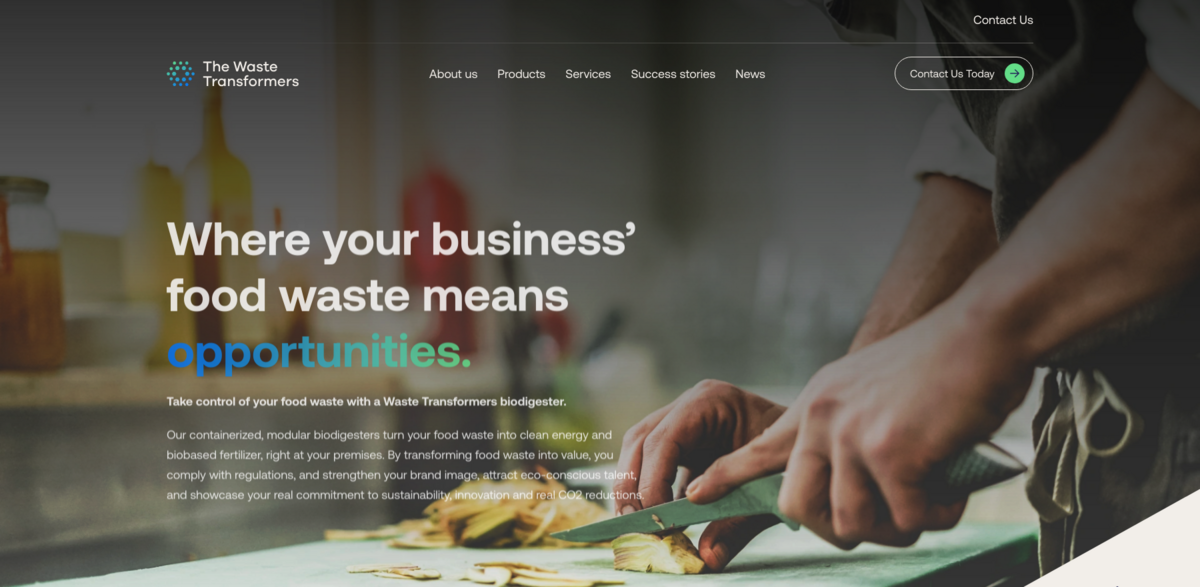What Is the Waste Transformers Project?
Imagine turning your business’s food waste into something valuable—clean energy and natural fertilizer—right on your own premises. That’s exactly what the Waste Transformers project offers. Using containerized, modular biodigesters, this innovative system processes food waste on-site, transforming it into renewable energy and bio-based fertilizer. It’s a smart way to comply with regulations, cut down on waste disposal costs, and boost your brand’s image by showing real commitment to sustainability and innovation. Plus, it helps reduce CO2 emissions in a tangible way. No more just throwing food waste away—now it’s an opportunity.
Main Benefits of Managing Food Waste On-Site
Managing food waste on-site with a Waste Transformer biodigester comes with some serious perks. Here’s a quick look at the key figures and facts that make this solution stand out:
- Daily food waste capacity: 350 kilograms
- Yearly food waste processing capacity: 121 tons
- Net yearly electricity output: 27 MWh
- Net yearly heat output: 49 MWh
- Liquid fertilizer output: 113 cubic meters
These numbers show how much impact a compact system like the Waste Transformer ADX1 can have, even on sites with limited space. It’s designed to be efficient, clean, and user-friendly, making it a practical choice for businesses looking to take control of their food waste.
Why On-Site Food Waste Management Matters
Doing nothing with your food waste? That’s a risky move. Businesses that keep sending food waste to landfills or incinerators face strategic risks that can hurt their operations, reputation, and finances. High disposal costs, increased Scope 3 emissions, and potential penalties from new food waste legislations are just the tip of the iceberg. On-site biodigestion not only avoids these pitfalls but also turns waste into a resource, helping companies meet tough sustainability goals and stay ahead of regulations.
How the Waste Transformer ADX1 Works
The Waste Transformer ADX1 is a compact powerhouse. It processes up to 350 kilograms of food waste daily, converting it into renewable energy and liquid fertilizer. Its high-efficiency combined heat and power (CHP) unit, rated A+++, transforms biogas into electricity and heat. Plus, it handles mixed food waste streams with ease. The system fits into small spaces—just 8 by 10 meters—and comes with remote monitoring for real-time performance tracking. It’s designed for hassle-free, reliable operation that integrates smoothly into existing business workflows.
Advantages of Using the Waste Transformer ADX1
What makes the ADX1 stand out? Here’s the lowdown:
- User-friendly: No need for biogas expertise—just feed in your food waste.
- Compact & clean: Keeps your site tidy and professional, perfect for urban settings.
- Extended equipment lifespan: Comes with a Materials Service Contract to protect your investment.
- Hassle-free operations: Seamless integration with your existing systems, backed by expert support.
It’s designed to make daily food waste management as simple and efficient as possible, so businesses can focus on what they do best.
Project Impact on Sustainable Development Goals (SDGs)
- SDG 7: Affordable and Clean Energy – by producing renewable energy on-site.
- SDG 9: Industry, Innovation, and Infrastructure – through innovative waste processing technology.
- SDG 11: Sustainable Cities and Communities – by enabling clean, compact waste management solutions.
- SDG 12: Responsible Consumption and Production – by diverting food waste from landfills.
- SDG 13: Climate Action – through significant reductions in CO2 emissions.
Looking Ahead: The Future of Food Waste Management
Food waste is one of the biggest environmental challenges businesses face today. The Waste Transformers project offers a smart, tangible solution that turns this challenge into an opportunity. By adopting on-site biodigestion, companies not only reduce their environmental footprint but also showcase leadership in sustainability. It’s about more than just compliance—it’s about making a real difference, attracting eco-conscious customers and talent, and building a resilient, future-ready business. The future of food waste management is here, and it’s cleaner, greener, and smarter.






















